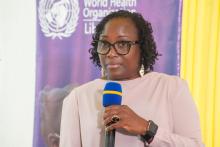Liberia Successfully Concludes a Three-Day COVID-19 After Action Review Symposium

Monrovia, 19 July 2023 - The Ministry of Health in Liberia has successfully concluded a three-day COVID-19 pandemic response After Action Review (AAR) symposium in Monrovia with all the sectors that were involved in and/or affected by the pandemic. The symposium, held from July 17 to July 19, 2023, at the E.J.S Ministerial Complex in Congo Town, allowed the identification of good practices, gaps and lessons learned, and proposed actions to build a more resilient health system to better manage public health emergencies. The COVID-19 outbreak in Liberia began on 16th March 2020, with the country reporting its first confirmed case in Monrovia, the capital city. The response to the outbreak centered on case finding, isolation, testing, vaccination and providing care to confirmed cases, while tracing and quarantining contacts. As of July 19, 2023, Liberia recorded a total of 8,155 confirmed cases of COVID-19, with 294 deaths and 404 health worker infections. The recovery rate as of the same date was estimated at an encouraging 96.4%.
During the opening ceremony of the AAR symposium, Acting Minister of Health Ms. Norwu Howard expressed her gratitude to partners including the US Government and the World Health Organization for their continued collaboration and support. She praised the diplomatic relationship and assistance received before, during, and after the COVID-19 pandemic. Dr. Howard emphasized the implementation of lessons learnt, best practices from COVID-19 to enhance national and community preparedness for public health emergencies using the one health approach.
"As the Government, we remain committed to the cultivation of an integrated response culture to public health emergencies, building a resilient health system that is capacitated to effectively address future health shocks, while maintaining delivery of routine health care to all and we will continue to share our experiences with other countries," said Ms. Howard.
Representing the Ministry of Education, the Honourable Minister of Education Dr. Ansu Sonii shared his personal experience on how he struggled as a COVID-19 patient
“ I can tell the story, I did not only hear about COVID-19 but I lived it”, recalls Dr. Sonii on his experience as a COVID-19 patient. He thanked all stakeholders for their sacrifices and look forward to the recommendations that will make Liberia a safe place.
The AAR symposium participants reviewed the preparedness for COVID-19 pandemic that was in place before the country confirmed its first case, response accomplishments, lessons learnt, best practices, what went well and why, why went less well and why; developed mitigation measures as well as immediate, medium and long term recommendations focusing on various pillars of the response to enhance future response efforts.
The nineteen pillars reviewed included but not limited to Country-level coordination, planning and monitoring, risk communication and community engagement, surveillance and case investigation, border health and Points of Entry, national laboratory systems, Infection prevention and control, case management and research, operational support and logistics, essential health services , COVID-19 vaccinations, vulnerable and marginalized populations, national legislation and financing, public health and social measures, mental health , urban preparedness and response, mass gatherings , health system recovery and resilience, Preventing and Responding to Sexual Exploitation, Abuse and Harassment and other cross-cutting issues determined by the country’s context.
Liberia's Chief Medical Officer in the Ministry of Health, Dr. Francis Kateh, appreciated the participation of all stakeholders, acknowledging the critical role the After-Action Review plays in improving public health emergency management. He stressed the importance of sincere self-reflection, learning from past experiences, and rectifying any mistakes made during the response to COVID-19.
At the closing of the symposium, speaking on behalf of the US-CDC, Madam Claudette Grant, Deputy Country Director of the United States Center for Disease Control (US CDC), congratulated Liberia on the milestone.
"This symposium has been important to critically review all aspects of collaboration, partnerships, and how it shaped the outcome of our response efforts; and map the resources needed to preposition for future emergencies," she said.
WHO Emergency Preparedness Response Team Lead Dr. Julius Monday, highlighted the significance of reflecting on what have been learned from COVID-19 response to better position the country for ongoing COVID-19 work and future public health emergencies while documenting Liberia's successful approaches will not only be useful to the country but will also serve as a reference for other countries.
"Liberia's efforts in combating and defeating COVID-19 have been remarkable. It's one of the - countries in Africa with a high COVID-19 vaccination rate of the general population and is among the first batch of countries to conduct a COVID-19 After Action Review. I believe that the insights gained from this review will guide our steps forward in building resilient health systems and communities to prevent and respond to COVID-19 and other public health threats with minimum disruption to essential health services," narrated Dr. Monday.
Climaxing the three-day symposium, the Ministry of Health, with support from the World Health Organization and financial assistance from the European Union, led participants in consolidating a plan to address gaps, challenges, and lessons learned, which will inform the COVID-19 Transition plan. Additionally, the teams documented Liberia's experiences during the COVID-19 pandemic period from March 16, 2020, to May 5, 2023. The symposium brought together a diverse array of stakeholders, including County Health Teams, Ministries, the National Disaster Management Agency, and partner organizations such as WHO, US-CDC, AFNET, Jhpiego, GIZ, Religious leaders, and youth representatives, among others.
Liberia's dedication to learning from past experiences and implementing best practices sets a commendable example in building a healthier, safer, and more resilient future for all. The insights gained from this review will undoubtedly contribute to strengthening the country's preparedness and response efforts for any future public health emergencies, ensuring the well-being of its citizens and fostering collaboration among health partners. Together, as a united global community, we can build a future that is better equipped to face any crisis that may occur.







